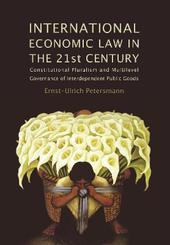
|
International Economic Law in the 21st Century: Constitutional Pluralism and Multilevel Governance of Interdependent Public Good
Paperback / softback
Main Details
| Title |
International Economic Law in the 21st Century: Constitutional Pluralism and Multilevel Governance of Interdependent Public Good
|
| Authors and Contributors |
By (author) Ernst-Ulrich Petersmann
|
| Physical Properties |
| Format:Paperback / softback | | Pages:574 | | Dimensions(mm): Height 234,Width 156 |
|
| ISBN/Barcode |
9781849460637
|
| Classifications | Dewey:343.087 |
|---|
| Audience | | Professional & Vocational | | Tertiary Education (US: College) | |
|---|
|
Publishing Details |
| Publisher |
Bloomsbury Publishing PLC
|
| Imprint |
Hart Publishing
|
| Publication Date |
24 July 2012 |
| Publication Country |
United Kingdom
|
Description
The state-centred 'Westphalian model' of international law has failed to protect human rights and other international public goods effectively. Most international trade, financial and environmental agreements do not even refer to human rights, consumer welfare, democratic citizen participation and transnational rule of law for the benefit of citizens. This book argues that these 'multilevel governance failures' are largely due to inadequate regulation of the 'collective action problems' in the supply of international public goods, such as inadequate legal, judicial and democratic accountability of governments vis-a-vis citizens. Rather than treating citizens as mere objects of intergovernmental economic and environmental regulation and leaving multilevel governance of international public goods to discretionary 'foreign policy', human rights and constitutional democracy call for 'civilizing' and 'constitutionalizing' international economic and environmental cooperation by stronger legal and judicial protection of citizens and their constitutional rights in international economic law. Moreover intergovernmental regulation of transnational cooperation among citizens must be justified by 'principles of justice' and 'multilevel constitutional restraints' protecting rights of citizens and their 'public reason'. The reality of 'constitutional pluralism' requires respecting legitimately diverse conceptions of human rights and democratic constitutionalism. The obvious failures in the governance of interrelated trading, financial and environmental systems must be restrained by cosmopolitan, constitutional conceptions of international law protecting the transnational rule of law and participatory democracy for the benefit of citizens.
Author Biography
Ernst-Ulrich Petersmann is Professor of International and European Law at the European University Institute at Florence.
ReviewsThe arguments are persuasive and are both legal and philosophical...There is no other book being written to make such strong and clear argument about the problems of IEL before...The book definitely deserves the highest academic recognition from many perspectives. -- Chang-fa Lo * Asian Journal of WTO and International Health Law and Policy, Volume 8:345 * For his distinct and distinctive reconceptualization of IEL, Petersmann deserves our thanks and praise. -- Gonzalo Villalta Puig * Leiden Journal of International Law, Volume 26. Issue 04. * For over three decades, the scholarship of Professor Ernst-Ulrich Petersmann has illuminated trade law for academics, practitioners, and students alike. Writing with intensity, persuasiveness, and enviable productivity, Petersmann has opened more new doors into our thinking about international economic law (IEL)2 than any scholar of his generation...Peterman's new treatise, International Economic Law in the 21st Century, lays out his intellectual edifice in its most comprehensive and inspirational form to date. -- Steve Charnovitz * Journal of International Economic Law, Vol. 17, no 1 * ... Petersmann's recent work is undoubtedly a significant contribution to the indeed indispensable global discourses on the future directions to be taken by the lawmaking as well as law enforcement processes in the international economic system, and it is thus highly recommended to scholars and practitioners interested in this important issue of our time. -- Karsten Nowrot * European Yearbook of International Economic Law 2014 *
|